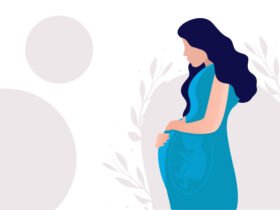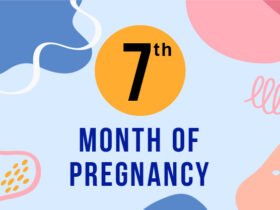Back in September 2017, 36-year-old, Serena Williams gave birth to her daughter Alexis Olympia. According to the tennis champion, she knew she was seven weeks pregnant while participating in the Australian Open.
Serena stated that she had a period just before taking the pregnancy test, a statement that came to many as a surprise. Her case among many others raises many questions, with people asking if it’s possible to have periods and still be pregnant. The answer to this question is no, despite all the convincing out there. A shallow digging at your science notes will remind you that periods occur every month.
The ovary releases the eggs once a month. If the released egg fails to be fertilized, it travels out of the uterus through the vagina. Periods are therefore as a result of the shedding of the endometrium or the lining of the uterus. This shedding occurs because of ovulation and changes in progesterone and estrogen. The fact that women don’t ovulate while pregnant should tell you that you must not confuse any bleeding with a period. Whatever you may be experiencing isn’t menstruation but a spotting, which is usually dark brown or light pink in color. Bleeding during the pregnancy period is common, but it’s not normal.
Many women have proceeded and had healthy babies even after experiencing a spotting, especially, during their first trimester. The intensity of the bleeding should act as an indicator of when it’s time to call your doctor for assistance. Without saying much, here are some of the reasons you may experience spotting while pregnant.
1. Cervical changes
Spotting, or what you may confuse with periods, can happen some moments after you get pregnant because of changes in the cervical. Such scenarios are common, especially, after having sex. As far as there is no infection, bleeding caused by such a situation doesn’t necessarily need a doctor. With little time, the spotting will disappear by itself.
2. Implantation bleeding
This particular bleeding usually happens during the early stages of the pregnancy period. Like in the case of Serena Williams, you may not have taken the pregnancy test yet. What confuses many is the fact that it happens during the time that you should be expecting your periods. This timely bleeding shouldn’t at any one moment be confused for periods as it’s as a result of the fertilized egg implanting itself into the uterus. Also, the bleeding is usually light or just spotting as opposed to a period which is dark.
3. Miscarriage
Consistent bleeding after you get pregnant shouldn’t be confused with a period, as it can be a sign that you’re experiencing a miscarriage. This type of bleeding is usually associated with uterine cramping. During a miscarriage, you may experience the passage of huge clots from your vagina. Such symptoms should be an indication that you need to see a specialist immediately. A doctor or local ER is well placed to understand how to go about with the situation. He or she can save you from a miscarriage which places both your life and that of your unborn child at risk.
4. Ectopic pregnancy
Ectopic pregnancy, also known as tubal pregnancy, is a common complication during the pregnancy period. This type of pregnancy could also be the one causing bleeding while you’re pregnant. When it comes to ectopic pregnancy, the amount of bleeding varies, it’s more. Besides, the condition is usually accompanied by unilateral pain, light-headiness or dizziness. According to health experts, an ectopic pregnancy is lifethreatening, especially if it breaks. Therefore, in case such symptoms reveal themselves, you shouldn’t hesitate to give your doctor or the local ER a call.
5. Placenta abruption
This particular bleeding mostly occurs during the last few months of the pregnancy period. It should never be confused with a period as it is usually as a result of the placenta detaching itself from the uterus. In the process, the detachment causes heavy bleeding which is usually accompanied by cramping and pain. According to health experts, conditions such as high blood pressure can accelerate the dangers of placental abruption.
Other causes of bleeding :
- Infections
- Molar pregnancy
- Uterine rupture
- Preterm labor
- Placenta previa
These conditions can be accompanied by symptoms such as :
- Back pain,
- Abdominal/cramp pains
- unconsciousness
- Fatigue
- Shoulder pain
- Fever
- Nausea
- Vaginal discharge














Leave a Reply